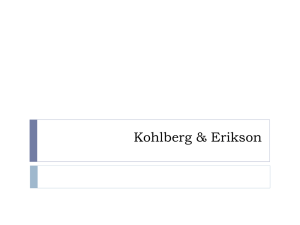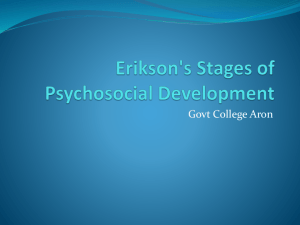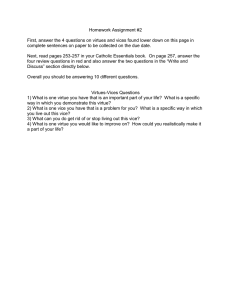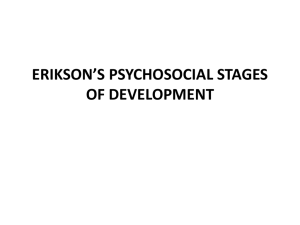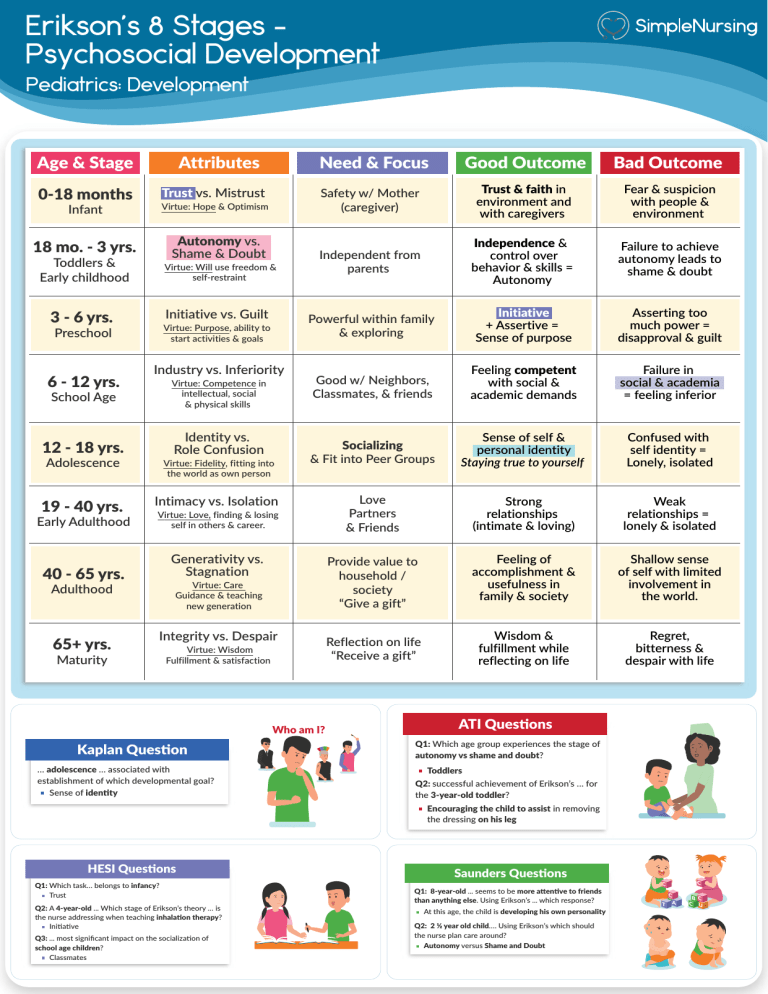
Erikson’s 8 Stages Psychosocial Development Pediatrics: Development Age & Stage Attributes 0-18 months Trust vs. Mistrust Virtue: Hope & Optimism Infant Autonomy vs. Shame & Doubt 18 mo. - 3 yrs. Toddlers & Early childhood Virtue: Will use freedom & self-restraint Initiative vs. Guilt 3 - 6 yrs. Virtue: Purpose, ability to start activities & goals Preschool 6 - 12 yrs. Need & Focus Industry vs. Inferiority School Age Virtue: Competence in intellectual, social & physical skills 12 - 18 yrs. Identity vs. Role Confusion Good Outcome Bad Outcome Safety w/ Mother (caregiver) Trust & faith in environment and with caregivers Fear & suspicion with people & environment Independent from parents Independence & control over behavior & skills = Autonomy Failure to achieve autonomy leads to shame & doubt Powerful within family & exploring Initiative + Assertive = Sense of purpose Asserting too much power = disapproval & guilt Good w/ Neighbors, Classmates, & friends Feeling competent with social & academic demands Failure in social & academia = feeling inferior Socializing & Fit into Peer Groups Sense of self & personal identity Staying true to yourself Confused with self identity = Lonely, isolated Adolescence Virtue: Fidelity, fitting into the world as own person 19 - 40 yrs. Intimacy vs. Isolation Love Partners & Friends Strong relationships (intimate & loving) Weak relationships = lonely & isolated Generativity vs. Stagnation Provide value to household / society “Give a gift” Feeling of accomplishment & usefulness in family & society Shallow sense of self with limited involvement in the world. Reflection on life “Receive a gift” Wisdom & fulfillment while reflecting on life Regret, bitterness & despair with life Early Adulthood Virtue: Love, finding & losing self in others & career. 40 - 65 yrs. Virtue: Care Guidance & teaching new generation Adulthood 65+ yrs. Integrity vs. Despair Maturity Virtue: Wisdom Fulfillment & satisfaction Who am I? Kaplan Question … adolescence … associated with establishment of which developmental goal? Sense of identity ATI Questions Q1: Which age group experiences the stage of autonomy vs shame and doubt? Toddlers Q2: successful achievement of Erikson’s … for the 3-year-old toddler? Encouraging the child to assist in removing the dressing on his leg HESI Questions Q1: Which task… belongs to infancy? Trust Q2: A 4-year-old ... Which stage of Erikson’s theory … is the nurse addressing when teaching inhalation therapy? Initiative Q3: ... most significant impact on the socialization of school age children? Classmates Saunders Questions Q1: 8-year-old ... seems to be more attentive to friends than anything else. Using Erikson’s ... which response? At this age, the child is developing his own personality Q2: 2 ½ year old child…. Using Erikson’s which should the nurse plan care around? Autonomy versus Shame and Doubt C C C T A C B C C U

